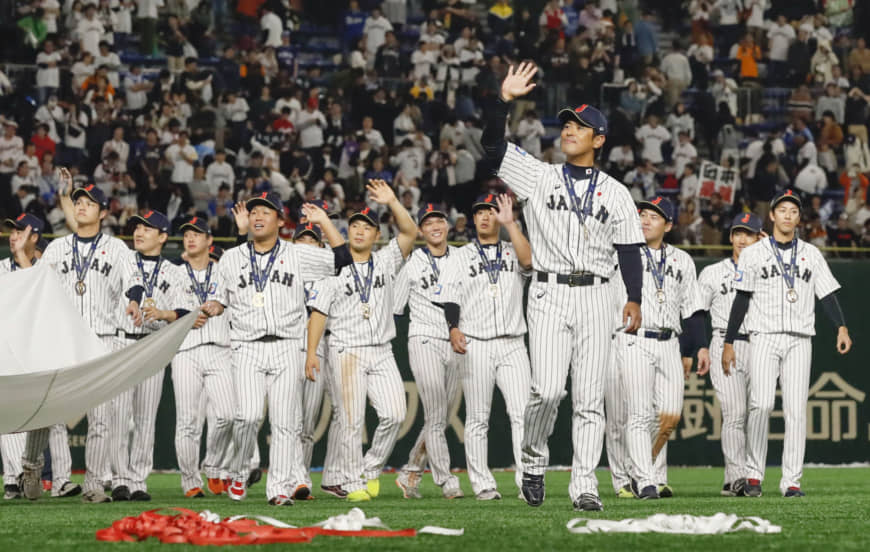
Samurai Japan manager Atsunori Inaba, during a lecture in Hokkaido last month, noted there was no parade after the national team’s win in the Premier12 in November.
The Premier12, after all, was a tournament featuring the top 12 teams in the world, though without their MLB talent. Not only did Japan win, it represented the senior team’s first world title since the 2009 World Baseball Classic.
Inaba’s observation also came after Japan’s rugby team, the Brave Blossoms, were lavished with praise by throngs of fans, many of them new to the sport, in the streets of Tokyo following the Rugby World Cup.
You can understand what Inaba might’ve been getting at. The rugby team’s historic run to the quarterfinals ignited a boom in Japan and helped make the first World Cup outside a traditional rugby stronghold a success. They deserved praise. But the baseball team, lest we forget, won its tournament.
“We were the best in the world and didn’t get a parade,” Inaba noted. according to Nikkan Sports. “There is a dangerous feeling for baseball.”
The danger is that, even as one Japan’s major sports, there are cracks in baseball’s armor. Sumo is Japan’s national pastime, but baseball has held its heart for decades.
But the game is facing threats. There’s more competition for athletes from soccer and rugby and that’s to say nothing about Japan’s shifting demographics. Also, in this day and age of technology, there are simply more things vying for the attention of potential players and fans.
The upcoming Tokyo Olympics, however, are an opportunity for the game. Winning Olympic gold, even without MLB players participating, is the type of thing that gets attention.
A rising tide lifts all boats and the Olympic spotlight can only help baseball cultivate new fans and maybe encourage more participation at the grassroots level.
If the people running NPB are worth their salt, there are already plans in place to capitalize on a good showing by Samurai Japan.
Unlike some other sports, baseball won’t dip out of the public eye once Tokyo 2020 is over. The Japanese baseball season will resume after the Olympic tournament — Japan’s MLB stars will be playing while Tokyo 2020 is going on — and retaining fans drawn in by the Olympic glow has to be high on the agenda. Baseball’s core audience isn’t getting any younger and any chance to connect with a new generation, or new fans in general, is important to the sustained health of the domestic game.
Of course, the major prerequisite for all that is for Samurai Japan to win gold.
The lack of MLBers is actually to Japan’s advantage and the country won the Premier12 under similar circumstances. Inaba could field an even stronger team for Tokyo 2020 if he gets ace pitchers Kodai Senga and Tomoyuki Sugano on board and perhaps hitters such as Yuki Yanagita.
For all its renown, Japan has never won Olympic gold in baseball. Being on home soil will add to the pressure. So will the fact there won’t be another chance anytime soon, with baseball already off the program for the Paris Games in 2024.
Winning would also help wash away the bitter taste lingering from the last time the sport was in the Olympics. That was in Beijing in 2008, and a Japanese team with a number of future MLB players (Norichika Aoki, Yu Darvish and Masahiro Tanaka to name a few) finished fourth and came back empty handed. It’s not a stretch to say that squad could be a cautionary tale for Inaba’s players. Inaba, after all, was on the team himself.
In no way is baseball doomed if Japan fails to win gold. But success could still give the game a nice boost.
The Brave Blossoms were celebrated as much for what they did on the field as for the potential lasting impact they might have on rugby in Japan and Japanese rugby’s standing around the world.
Inaba may well get his parade — or at least be part of one — in due time. But he’ll have to earn it first and, on some level, do for his sport what the rugby team did for theirs.
Source : Baseball – The Japan Times